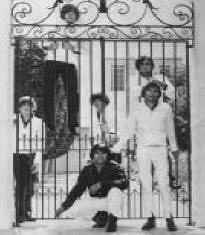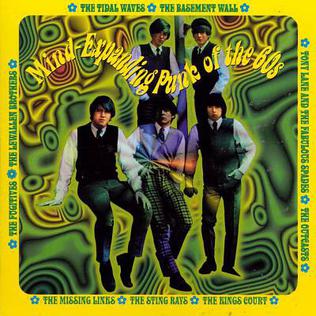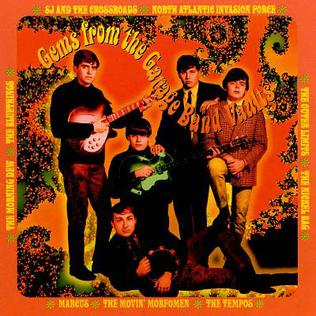
The Pebbles Box is a 5-LP box set of mid-1960s garage rock and psychedelic rock recordings, primarily by American bands. Several years later, a similar 5-CD box set was released that was called the Trash Box. The Pebbles Box purports to collect the first five volumes of the Pebbles series, although there are fewer songs than on the original LPs: 72 total tracks on the five discs, as compared with 86 on the original LPs. Also, as is generally true of the CD reissues of these five volumes, the tracks differ significantly on all five discs as compared to both the original Pebbles LPs and the later Pebbles CDs in the corresponding volumes; and the surf rock rarities on Pebbles, Volume 4 have been eschewed entirely.

Trash Box is a 5-CD box set of mid-1960s garage rock and psychedelic rock recordings, primarily by American bands. This box set is similar to the earlier Pebbles Box and includes almost all of the same recordings in that box set, along with numerous bonus tracks at the end of each disc. Supposedly, the Trash Box collects the first five volumes of the CDs in the Pebbles series. However, as is generally true of the CD reissues of these five volumes, the tracks differ significantly on all five discs as compared to both the original Pebbles LPs and the later Pebbles CDs in the corresponding volumes; and the surf rock rarities on Pebbles, Volume 4 have been eschewed entirely. Overall, there are 109 tracks in the box set as compared to 101 songs on the individual CDs and 72 tracks in the Pebbles Box.

Pebbles, Volume 6: Chicago Pt. 1, also known as Chicago 1, is a compilation album featuring American garage and psychedelic rock musical artists from the 1960s that were associated with the Chicago music scene. It is a compact disc installment of the Pebbles series, and was released on AIP Records in 1994.

The Human Expression was an American garage and psychedelic rock band from Los Angeles that released three well-regarded singles, and made additional demo recordings between 1966 and 1967.

Question Mark & the Mysterians is the third studio album by the garage rock band? and the Mysterians, known for their No. 1 1966 hit "96 Tears". The album was recorded by the original members of the band as a result of their inability to access their masters or re-release their own earlier material, which had passed from the ownership of label Cameo to Allen Klein. It included all of the songs released on their first album, 96 Tears, as well as several other tracks. The rerecorded version of "96 Tears" was subsequently incorporated into compilations.

Garage Beat '66 Volume 5: Readin' Your Will,"is the fifth installment in the Garage Beat 66 series of garage rock compilations issued by Sundazed Records, which is available exclusively on compact disc. This volume was released on June 21, 2005 and consists of a mixture of raw up-tempo numbers as well as some psychedelic. Like all of the entries in the series, which is noted for good sound quality, all of the tracks are mastered from the original studio master sources and contain well-researched liner notes written by knowledgeable authorities. Volume 5 is mentioned by AllMusic as perhaps the best collection in the series.
Green Crystal Ties is an extensive series of compilation albums focusing on obscure and relatively unknown psychedelic and garage rock musical artists that recorded during the 1960s and early 1970s. Released on Collectables Records, Green Crystal Ties features ten total albums, all of which were issued in 1998. For the most part, the albums expand on past series distributed by Collectables Records and its contemporary Cicadelic Records, and as with Nuggets employ original master source elements when possible and arrange the various installments along contextual and conceptual lines. The music tends to be more refined in the earlier volumes of the series, progressively venturing out into more obscure and unknown material later much in the same fashion as the Pebbles or Back from the Grave series. The various installments are not ordered chronologically, but instead place emphasis on certain regions or musical styles. Although most of the music was recorded by American groups, there are a few exceptions such the heavy metal band Black Sabbath and King Richard and the Knights. Green Crystal Ties pays homage to the band the Zakary Thaks and their song of the same name. All of the entries are housed highly colorful packaging designed by Nicole Ruhl Fichera and each features a photograph one of one of the compiled bands on the front cover. The packaging for all entries includes well-researched liner notes written by Steve Kaplan and Matt Wendelken which provide helpful biographical information about the bands and their songs.

Green Crystal Ties, Volume 10: 60s Garage Band Flasback is a compilation album featuring psychedelic and garage rock musical artists that recorded in the 1960s and early 1970s. It is the tenth and final installment of the Green Crystal Ties series and was released on Collectables Records on April 7, 1998. The album arguably features the most obscure musical artists featured in the series.

Green Crystal Ties, Volume 9: The Great Lost Psychedelic Garage Bands is a compilation album featuring obscure American psychedelic rock musical artists that recorded in the 1960s. It is the ninth installment of the Green Crystal Ties series and was released on Collectables Records on April 7, 1998. The album is considered one of the series best showings of psychedelic music.

Green Crystal Ties, Volume 6: Rarities from the Psychedelic Vaults is a compilation album featuring obscure psychedelic rock bands that recorded in the 1960s. It is the sixth installment of the Green Crystal Ties series and was released on Collectables Records on April 7, 1998. Though Volume 6 focuses specifically on psychedelia, the album is commended for featuring a wide-diversity of musical styles intertwined in the genre.

Green Crystal Ties, Volume 7: Mind-Expanding Punk of the 60s is a compilation album featuring American psychedelic and garage rock musical artists that recorded in the 1960s. It is the seventh installment of the Green Crystal Ties series and was released on Collectables Records on April 7, 1998. The album is not so "Mind-Expanding"—alluding to psychedelic music -- Volume 7 does offer the most hard-edged musical stance within the series.

Green Crystal Ties, Volume 1: Garage Band Rebels is the first installment in the Green Crystal Ties series of psychedelic and garage rock compilations issued by Collectables Records. It was released on April 7, 1998 and focuses on bands from Texas who were active in the 1960s and early 1970s such as the Zakary Thaks, The Bad Seeds, the Liberty Bell from Corpus Christi. Like all of the entries in the series, the highly colorful packaging is designed by Nicole Ruhl Fichera and on this occasion features a photograph of the Zakary Thaks on front. The inner sleeve includes through liner notes written by Steve Kaplan and Matt Wendelken which provide helpful biographical information about the bands and their songs.

Green Crystal Ties, Volume 2: The Best of the 60s Garage Band Scene is the second installment in the Green Crystal Ties series of psychedelic and garage rock compilations issued by Collectables Records. It was released on April 7, 1998 and features songs by obscure American musical artists who recorded in the 1960s and early 1970s. Like all of the entries in the series, the highly colorful packaging is designed by Nicole Ruhl Fichera and features a picture of the Basement Wall from Baton Rouge, Louisiana on front. The inner sleeve includes well-researched liner notes written by Steve Kaplan and Matt Wendelken which provide helpful biographical information about the bands and their songs.

The Lewallen Brothers were an American garage rock band formed in Tucson, Arizona in 1962. Combining an element of folk rock, similar to the sound of the Beau Brummels, with the essence of a raw garage band, the group became immensely popular in Arizona. Though the Lewallen Brothers never broke through to a national audience, the band is noted for being one of the longest-enduring garage musical acts to emerge from the 1960s, as the group performed well into the 1990s.

Green Crystal Ties, Volume 4: Mind-Expanding 60s Psychedelia is the fourth installment in the Green Crystal Ties series of psychedelic and garage rock compilations issued by Collectables Records. It was released on April 7, 1998 and like volume 1 features songs by Texas garage and psychedelic bands who recorded in the 1960s. The series is known for good quality mastering and sound quality. Like all of the entries in the series, the highly colorful packaging is designed by Nicole Ruhl Fichera. The inner sleeve includes well-researched liner notes written by Steve Kaplan and Matt Wendelken which provide helpful biographical information about the bands and their songs.

Green Crystal Ties, Volume 5: Gems from the Garage Band Vaults is the fifth installment in the Green Crystal Ties series of psychedelic and garage rock compilations issued by Collectables Records. It was released on April 7, 1998 and like volume 1 features songs by obscure bands who recorded in the 1960s. The series is known for good quality mastering and sound quality. Like all of the entries in the series, the highly colorful packaging is designed by Nicole Ruhl Fichera. The inner sleeve includes well-researched liner notes written by Steve Kaplan and Matt Wendelken which provide helpful biographical information about the bands and their songs.

Green Crystal Ties, Volume 8: Stomping Garage Band Legends is a compilation album featuring garage rock musical artists that recorded in the 1960s. It is the eighth installment of the Green Crystal Ties series and was released on Collectables Records April 7, 1998. The album, for what it lacks in complex lyricism, centers around frantic performances alluding to teenage alienation and angst toward society.
The Stumblin' Blox were an American garage rock band from Abilene, Texas who were active in the 1960s. They are known for songs such as "It's Alright." Though they failed to achieve commercial success, their works have come to the attention of garage rock enthusiasts and collectors over the years and have been included several compilations.

(Turn On) The Music Machine is the debut album by the American garage rock band the Music Machine, and was released on Original Sound Records on December 31, 1966. It arrived just months after the group's hit single, "Talk Talk", propelled to number 15 on the national charts. Although the album was hastily recorded to capitalize on the Music Machine's popularity, (Turn On) The Music Machine managed to become a moderate hit on the Billboard 200, and is hailed today as a classic garage rock piece. Another single, "The People in Me" was also released in support of the album.

The North Atlantic Invasion Force was an American garage rock band from New Haven, Connecticut who were active in the 1960s. They were led by vocalist and principal songwriter George Morgio, many of whose song lyrics were concerned with interpersonal relationships or were otherwise topical in nature, focusing issues such as free speech and the ongoing war in Vietnam.

















